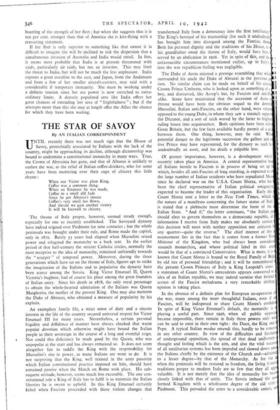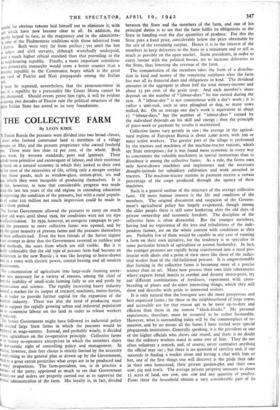THE STAR OF SAVOY
By AN ITALIAN CORRESPONDENT
UNTIL recently there was not much sign that the House of Savoy, proverbially associated by Italians with the luck of the country, might be approaching its decline, although dictatorship was
bound to undermine a constitutional monarchy in many ways. True, the Crown of Abyssinia has gone, and that of Albania is unlikely to outlast the war, to the relief of Italian coffee-drinkers, who for some years have been muttering over their cups of chicory this little rhyme:
When our Victor was plam King, Coffee was a common thing. When an Emperor he was made, Coffee to a smell did fade. Since he got Albania's throne Coffee's very smell has flown, And should we gain another victory It will be farewell to chicory.
The throne of Italy proper, however, seemed steady enough, especially for one so recently established. The Savoyard dynasty have indeed reigned over Piedmont for nine centuries ; but the whole peninsula was brought under their rule, and Rome made the capital, only in 1870. Barely 53 years had elapsed when Mussolini seized power and relegated the monarchy to a back seat. In the earlier period of that half-century the stricter Catholic circles, normally the most receptive to the idea of monarchy, remained unfriendly towards the " usurper " of temporal power. Moreover, during the three generations which have sat on the throne of Italy, figures apt to strike the imagination of the Italians and to popularise the dynasty have been scarce among the Savoia. King Victor Emanuel II, Queen Victoria's bugbear, had of course his place among the great founders of Italian unity. Since his death in 1878, the only royal personage to obtain the whole-hearted admiration of the Italians was Queen Margherita, the mother of the present King. One may also mention the Duke of Abruzzi, who obtained a measure of popularity by his exploits.
An exemplary family life, a strict sense of duty and a sincere interest in the 'life of the country secured universal respect for Victor Emanuel III for many years. Nevertheless, a certain personal frigidity and diffidence of manner have always checked that warm popular devotion which otherwise might have bound the Italian people to their sovereign in the course of a long and eventful reign.
• Nor could this deficiency be made good by the Queen, who was unpopular at the start and has always remained so. It does not seem altogether fair to saddle the King with the responsibility for
Mussolini's rise to power, as many Italians are wont to do. It is not surprising that the King, well trained in the utter passivity
which Italian constitutional practice imposed on him, should have remained passive when the March on Rome took place. His sub- sequent attitude, however, seems much less excusable. The one con- stitutional role a King of Italy has to fulfil is to maintain the Italian liberties he is sworn to uphold. In this King Emanuel certainly failed when Fascism proceeded with those violent changes that
II transformed Italy from a democracy into the first totalitarian The King's betrayal of his trusteeship (for such it undoubtedle has brought him into disregard among the Fascists th Both his personal dignity and the traditions of his House, to his grandfather owed the throne of Italy, would have been served by an abdication in 1926. Yet in spite of this, and the unfavourable circumstances mentioned earlier, up to Italy's into the war republican feeling was negligible.
The Duke of Aosta enjoyed a prestige resembling that whi surrounded his uncle the Duke of Abruzzi in the previous g tion. No similar claim can be made on behalf of his cous Crown Prince Umberto, who is looked upon as something of a boy, and distrusted, like Aesop's bat, by Fascists and anti-F alike. Some have maintained that the accession of Aostat throne would have been the obvious sequel to the down: Mussolini. Italian anti-Fascists, on the other hand, were vehent opposed to the young Duke, in whom they saw a staunch suppo the Dictator, and a sort of stick waved by the latter to frighte ruling house into acquiescence. Both opinions have been cc Great Britain, but the few facts available hardly permit of a de between them. One thing, however, may be said. Wh potential danger to the legitimate succession the gallant and a tive Prince may have represented, for the dynasty as such he undoubtedly an asset, and his death a palpable loss.
Of greater importance, however, is a development which recently taken place in America. A central representative bod all Italians hostile to Fascism is in process of being set up t which, besides all anti-Fascists of long standing, is expected to a the large number of Italian residents who have repudiated Mu since he declared war on the U.S.A. Count Sforza, who has been the chief representative of Italian political emigration expected to become the leader of this organisation. Early this Count Sforza sent a letter to the New York Times, which the nature of a manifesto concerning the future status of Italy. is stated that a plebiscite must determine the form of the Italian State. "And if," the .letter continues, "the Italian should elect to govern themselves as a democratic republic, all information I receive from Italy makes me absolutely certain this decision will meet with neither opposition nor criticism f any quarter—quite the reverse." The chief interest of this nouncement lies in the fact that it comes from a former For Minister of the Kingdom, who had always been considel staunch monarchist, and whose political label in this co would be that of a convinced Conservative. What is more, it is known that Count Sforza is bound to the Royal Family of Belp by old ties of personal friendship ; and it will be remembered the present Crown Princess of Italy is King Leopold's sister. a statesman of Count Sforza's antecedents appears converted to idea of an Italian republic, we may indeed surmise that behind scenes of the Fascist melodrama a very remarkable shifting opinion is taking place.
In the absence of a definite plan for European co-operation at the war, many among the more thoughtful Italians, even if Fascists, will be indisposed to share Count Sforza's confide In spite of King Victor Emanuel's default, the monarchy is playing a useful part. Since 5926, when all public oppost became impossible, there remain in Italy three powers only w can be said to exist in their own right: the Duce, the King and Pope. A typical Italian modus vivendi this, hardly to be comet in any other country. In view of the difficulties and lirnitat of underground opposition, the spread of that dead uniformity thought and feeling which is the aim, and also the vital necesn of all totalitarian systems has been impeded and slowed down the Italians chiefly by the existence of the Church and--aclmitt to a lesser degree—by that of the Monarchy. As for the when the peninsula will be restored to freedom, the living histon traditions proper to modern Italy are so few that they all aP valuable. It is not merely that the idea of monarchy has bec closely linked with that of unity. The Savoia imbued the .a formed Kingdom with a wholesome degree of the old sPInt Piedmont. • This pervaded the army to a considerable extent, tin 1mi for obvious reasons laid himself out to eliminate it, with ts which have now become clear to all. In addition, the chy helped to fuse, in the magistracy and in the administra-- some of the Piedmontese traditions with those inherited from Austria. Both were very far from perfect ; yet until the last judges and civil servants, although wretchedly underpaid, .ed a much higher ethical standard than that prevailing in the t neighbouring republic. Finally, a more important considera- a democratic monarchy would seem a better counter than a tic republic to the Communist bogey which is the great card of Fascist and Nazi propaganda among the Italian •
e.
must be repeated, nevertheless, that the pronouncement in of a republic by a personality like Count Sforza cannot be tir dismissed. Should events prove him right, it will be evident !during two decades of Fascist rule the political structure of the m Italian State has rotted to its very foundations.



























 Previous page
Previous page